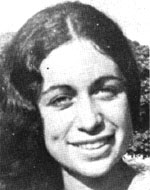Maroz, Rachel (‘Racheli’)
Daughter of Reuven and Shulamit. She was born on 17.6.1955 in Kibbutz Lohamei Hagetaot in the Ga’aton region, the daughter of parents of Holocaust survivors. She grew up like the rest of the kibbutz children, and yet received special attention from her parents, who had “the gift of happiness we received after years of waiting.” The mother’s parents, who came from Russia when she was a year and a half old, also gave her much love and indulgence. Racheli studied for eight years at the Janusz Korczak elementary school on Kibbutz Lohamei Hagetaot. Afterward, she moved to the “Sulam-Zur” high school in Gesher Haziv and chose the literary track. When Racheli was in fifth grade, the children were tested for music, and it turned out that Racheli was blessed with excellent hearing, and began to take lessons on the violin. But she did not produce the desired satisfaction, and then she was exposed to her passionate passion for dance, an art that suited her sensitive and turbulent spirit, and she discovered herself in dance and sunset In her ninth grade she began participating in conferences of the kibbutz members’ division And a short time later joined the Western Galilee Dance Company and participated in folk dance performances in various places in Israel, as part of the “Noachhoi Hatzir” program, Racheli played a major role, and when she was in 10th grade she began studying at the dance institute that opened at the Rothschild House in Haifa. She moved to Yehudit Arnon’s studio in Ga’aton. It was a year when she had achieved real achievements, which were conspicuous in every performance. Racheli was blessed with a unique personality. There was a kind of magic in her eye that caught everybody’s eye. Life revived within her like an increasing spring. “She remembers me as the ghost of the laughter and the smile, Racheli’s restlessness, the movement, Racheli’s life in their flow,” writes one of her teachers. “Racheli breathed life, love life, life, there was a smile,” says another teacher. At any time, and everywhere, she wanted to be inside the main citrus. Entertainment was a valuable component of her social life, provided that it was done in the company of original and creative people. As for the future, Racheli always saw herself in her farm, and her plans were tied to her. It seemed to her that she lived in harmony with the kibbutz and that she could fulfill all her personal dreams within the agriculture and with his help. “I believe,” she wrote to her dance teacher, “that if I want to continue dancing after the army, the agriculture will confirm this and I will not have to wait in line, because how can I tell the body ‘Wait until it’s your turn to study?’ It will simply degenerate. ” But there was no ‘after the army’. Racheli was drafted into the IDF on December 1, 1974, did her basic training and was assigned to the Dance Company of the Training Command for only three months, served in the army and enjoyed every day of service on the 24th of Shevat 5735 (5.2.1975) Her work was brought to rest in Kibbutz Lohamei Hagetaot, leaving behind her parents and brother, and Kibbutz Lohamei Hagetaot issued a memorial booklet expressing the love, admiration, grief and pain that enveloped Raheli’s life and death.
